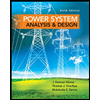
Electric machinery fundamentals
5th Edition
ISBN: 9780073529547
Author: Chapman, Stephen J.
Publisher: MCGRAW-HILL HIGHER EDUCATION
expand_more
expand_more
format_list_bulleted
Concept explainers
Textbook Question
Chapter 3, Problem 3.9P
The flux density distribution over the surface of a two-pole stator of radius r and length I is given by
Prove that the total flux under each pole face is
Expert Solution & Answer
Want to see the full answer?
Check out a sample textbook solution
Students have asked these similar questions
A plane wave traveling in z-direction through a medium with &=8, μ-2 and has
the electric and magnetic field intensity at z=0 shown in Fig. 6.1 and Fig. 6.2, respectively. Utilize the
provided information to find the following:
(a) w
(b) The intrinsic impedance of the medium
© B
(d) a
(e) The expression of the magnetic field intensity, H
(f) The time-average power carried by the wave
Magnetic Field Intensity (mA/m)
Electric Field Intensity (V/m)
0.5
0.4-
0.3
0.2
ཧཱུྃ༔ཤྲུསྦྱ ཌུ ཋ ; སྟྲི " ° ཝཱ
0.1
-0.5
Ex
-2.0
-1.5
-1.0
-0.5
0.0
0.5
1.0
1.5
Fig 6.2
Hy
2.0
Time (ns)².
-2.0
-1.5
-1.0
-0.5
0.0;
0.5
1.0
Time (ns)
2.0
0.083 ns or 0.0415 T
Don't use ai to answer I will report you answer
Please help me
Chapter 3 Solutions
Electric machinery fundamentals
Ch. 3 - What is the principal difference between a...Ch. 3 - Prob. 3.2QCh. 3 - Prob. 3.3QCh. 3 - What is the equation for the induced torque in an...Ch. 3 - The simple loop rotating in a uniform magnetic...Ch. 3 - Prob. 3.2PCh. 3 - The first ac power system in the United States ran...Ch. 3 - A three-phase, Y-connected, four-pole winding is...Ch. 3 - A three-phase, -connected, six-pole winding is...Ch. 3 - A three-phase, Y-connected, 60 Hz, two-pole...
Knowledge Booster
Learn more about
Need a deep-dive on the concept behind this application? Look no further. Learn more about this topic, electrical-engineering and related others by exploring similar questions and additional content below.Similar questions
- 3.7 The AM signal s(t) = Ac[1+kam(t)] cos(2nfct) is applied to the system shown in Figure P3.7. Assuming that |kam(t) 2W, show that m(t) can be obtained from the square-rooter output U3(t). s(t) Squarer v1(t) Low-pass 12(t) Square- filter ra(t) rooter V₁ (t) = 5² (t) 13(1)=√√12 (1) Figure P3.7arrow_forwardPlease help mearrow_forwardPlease help mearrow_forward
- Can you check my connections and answers.arrow_forwardA communication satellite is in stationary (synchronous) orbit about the earch (assume altitude of 22.300 statute miles). Its transmitter generates 8.00 W. Assume the transmit- ting antenna is isotropic. Its signal is received by the 210-ft diameter tracking parabo- loidal antenna on the earth at the NASA tracking station at Goldstone, California. Also assume no resistive loss in either antenna, perfect polarization match, and perfect impedance match at both antennas. At a frequency of 2 GHz, determine the: (a) power density (in watts/m²) incident on the receiving antenna. (b) power received by the ground-based antenna whose gain is 60 dB.arrow_forwardDetermine VO during the Negative Half Cycle of the input voltage, Vi 12 V f = 1 kHz -12 V C ... + 0.1 με Si R 56 ΚΩ Vo Vi 2 V - 0 +arrow_forward
- 50mV and 10kHz from the function generator to the input. The mulitmeter postive is connected to the output and negative to a ground. Is the circuit connected correctly? Yes or No. Does the reading look correct? I don't need calculations but will take them. I just need to know if the connection is right. Connect a signal generator to the input and set it for 50 mV Sine wave with a frequency of 10 kHz. Connect the output to a multimeter set to RMS voltage. Record the output voltage and frequency in the following table. Repeat the measurement for all given frequency values in the table.arrow_forwardThe input reactance of an infinitesimal linear dipole of length A/60 and radius a=A/200 is given by Xin = – 120 [In(€/a) — 1] tan(ke) Assuming the wire of the dipole is copper with a conductivity of 5.7 x 10' S/m, determine at f = 1 GHz the (a) loss resistance (b) radiation resistance (c) radiation efficiency (d) VSWR when the antenna is connected to a 50-ohm linearrow_forwardExample Solve the octic polynomial 2x⁸-9x⁷+20x⁶-33x⁵+46x⁴-66x³+80x²-72x+32=0 Solution Divide by x⁴ 2x⁴-9x³+20x²-33x+46-66/x + 80/x² - 72/x³ + 32/x⁴=0 Combine and bring terms 2(x⁴+16/x⁴) - 9(x³+8/x³) +20(x²+4/x²)-33(x+2/x) + 46= 0 Let use substitution Let x+2/x =u (x+2/x)²= u² x²+2x*2/x + 4/x² = u² x²+4/x²= u²-4 (x+2/x)³= x³+8/x³+3x*2/x(x+2/x) u³= x³+8/x²+6u x³+8/x³= u³-6u (x²+4/x²)²= x⁴+2x²*4/x² + 16/x⁴ (u²-4)²= x⁴+16/x⁴ + 8 x⁴+16/x⁴ = (u²-4)²-8 x⁴+16/x⁴ = u⁴-8u²+8 2(u⁴-8u²+8)-9(u³-6u)+20(u²-4)-33u+46=0 Expand and simplify 2u⁴-9u³+4u²+21u-18=0 After checking (u-1)(u-2) Are factors Then 2u²-3u-9=0 u=3, u=-3/2 Assignment question Solve the octic polynomial 2s⁸+s⁷+2s⁶-31s⁴-16s³-32s²-160=0 using the above example question, please explain in detailarrow_forward
arrow_back_ios
SEE MORE QUESTIONS
arrow_forward_ios
Recommended textbooks for you
 Power System Analysis and Design (MindTap Course ...Electrical EngineeringISBN:9781305632134Author:J. Duncan Glover, Thomas Overbye, Mulukutla S. SarmaPublisher:Cengage Learning
Power System Analysis and Design (MindTap Course ...Electrical EngineeringISBN:9781305632134Author:J. Duncan Glover, Thomas Overbye, Mulukutla S. SarmaPublisher:Cengage Learning

Power System Analysis and Design (MindTap Course ...
Electrical Engineering
ISBN:9781305632134
Author:J. Duncan Glover, Thomas Overbye, Mulukutla S. Sarma
Publisher:Cengage Learning
The Biot-Savart Law; Author: Jennifer Cash;https://www.youtube.com/watch?v=1BoIH6Quhiw;License: Standard Youtube License